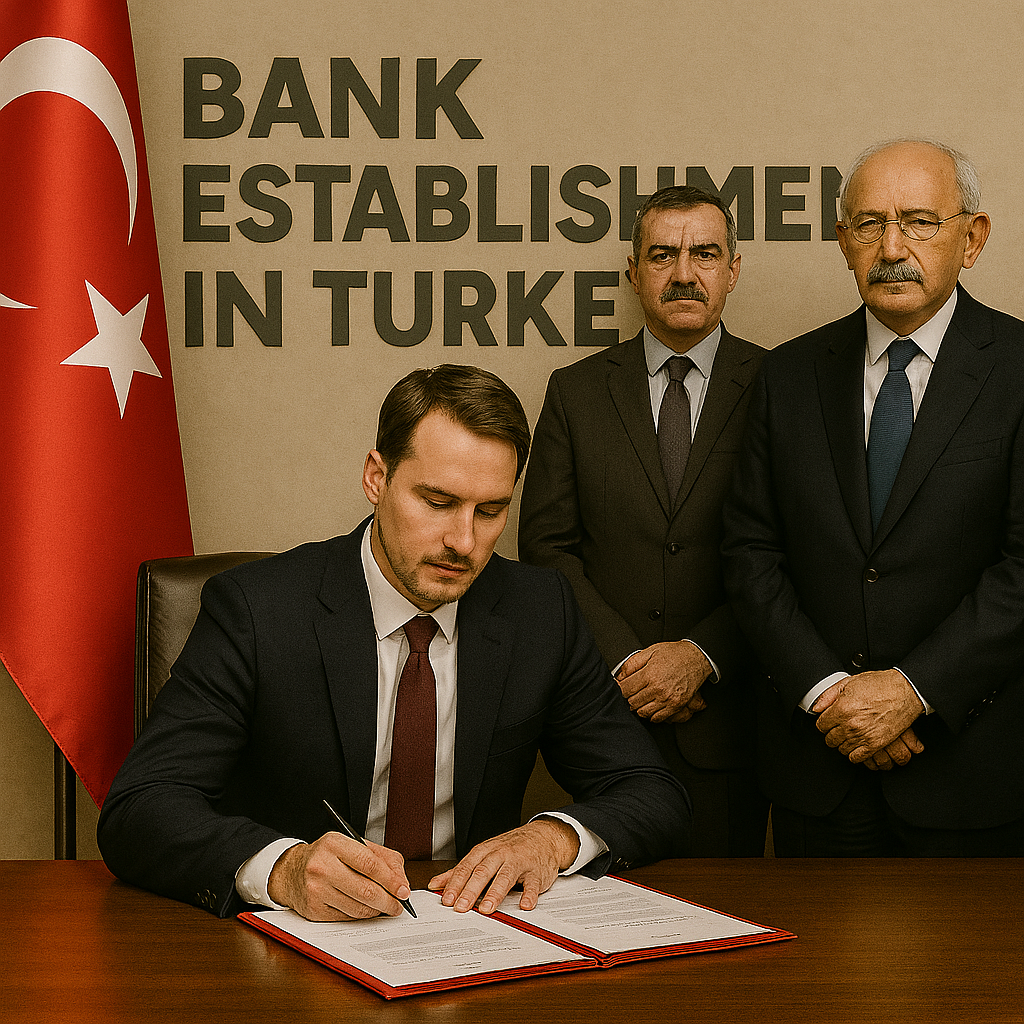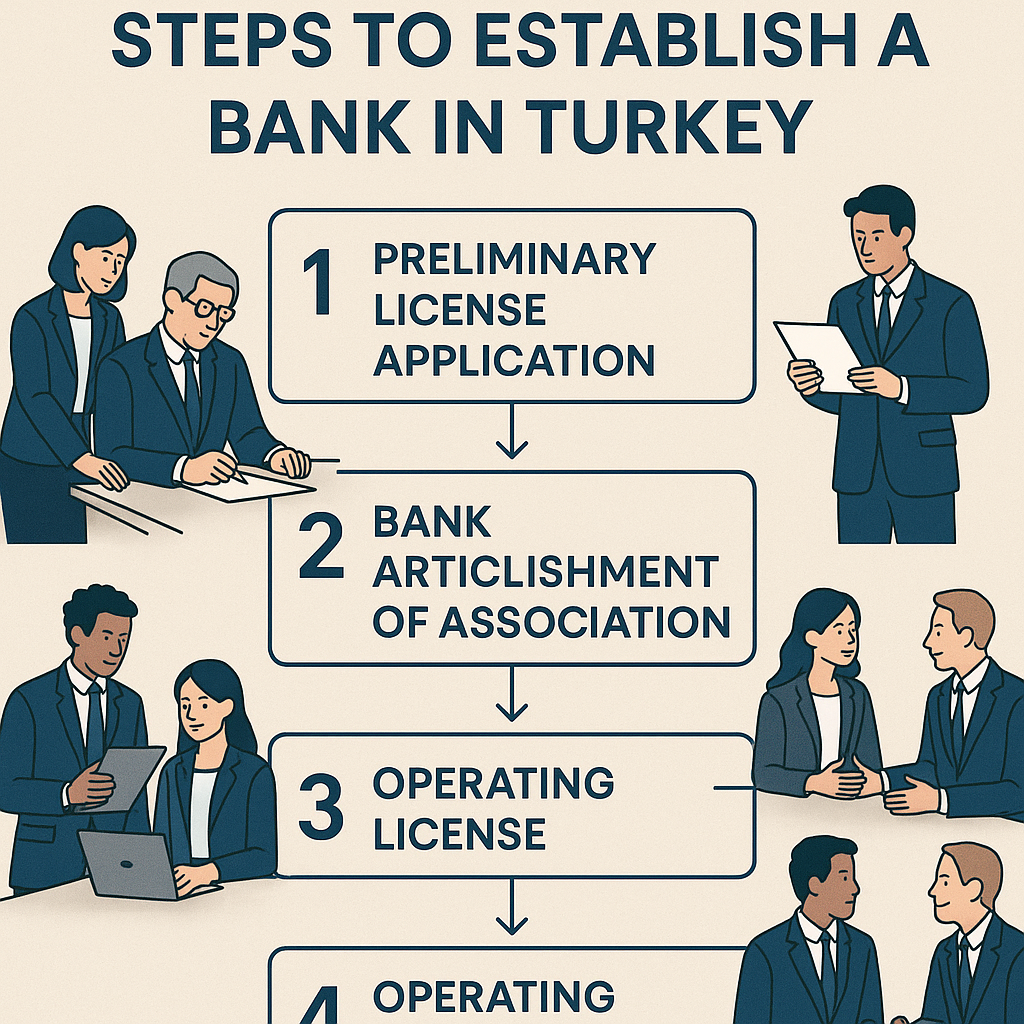“Want to Open a Bank in Turkey? Here’s What You Really Need to Know”
A Clear, Straightforward CEO Briefing for Decision Makers
🏁 Let’s Start With the Truth
Opening a bank in Turkey is not easy — but it’s 100% possible if you have the right capital, partners, and local support. Turkey is a G20 country with strict banking laws, but also huge potential. You’re not entering a startup environment — you’re entering a high-barrier, high-reward market.
Turkey offers a unique intersection of opportunity and complexity for financial entrepreneurs seeking to establish a banking institution. With its young population, expanding fintech ecosystem, proximity to Europe and MENA markets, and an increasingly reformist regulatory environment, Turkey stands out as a lucrative but highly regulated jurisdiction for establishing a bank.
This guide provides a step-by-step strategic roadmap for founders, investors, and financial groups aiming to enter the Turkish banking sector.

The image, titled “Establishing a Bank in Turkey,” shows a businessman in a formal setting, dressed in a suit, signing a banking license agreement. In the background is the Turkish flag and the words “Establishing a Bank in Turkey.”
Why Establish a Bank in Turkey?
- Large and Underbanked Market: Over 85 million people, yet significant portions of the population still rely on cash or informal banking.
- Regional Influence: As a financial gateway to Central Asia, the Balkans, and the Middle East, a Turkish banking license opens cross-border potential.
- Robust Legal Infrastructure: Governed by the Banking Law No. 5411, the system ensures regulatory transparency — and, for those who qualify, sustainable returns.
- Growing Fintech Ecosystem: Integration with open banking APIs, real-time payment infrastructure (FAST), and startup-ready digital rails.
⚖️ Legal Framework: What You Need to Know
All banking activity in Turkey is strictly regulated by the Banking Regulation and Supervision Agency (BDDK).
Key Legal References:
- Banking Law No. 5411
- Turkish Commercial Code
- Capital Market Law (if securities business is involved)
- CBRT (Central Bank of the Republic of Turkey) Guidelines
✅ No bank may operate in Turkey without a license issued by BDDK.
4 steps to establishing a bank in Türkiye

Form a Founding Group
- At least 5 real or legal persons must initiate the application
- Founders must have:
- No criminal record related to finance, fraud, or bankruptcy
- Demonstrated financial strength and credibility
2. Prepare a Founding Application
Must include:
- Business Plan (min. 5 years)
- Organizational Structure
- Shareholding structure
- Proof of paid-in capital (minimum: TRY 1 billion, ~USD 30 million as of 2025)
- Risk management and IT architecture plan
- Internal control and audit policies
3. Initial BDDK Approval
- BDDK evaluates the founders, capital adequacy, and feasibility
- Once approved, founders may proceed to establish the company legally
4. Formal Incorporation and Licensing
- Open legal entity at Turkish Trade Registry
- Deposit the entire capital in a blocked account at the Central Bank
- Establish all technical and operational infrastructure
- BDDK will conduct on-site inspections
- Final license issued once compliance is verified
⏱️ Typical timeline: 12–24 months
💰 Estimated Total Setup Cost: $30–50 million
Links To Help You:
1-) How to Set Up a Company in Turkey: Step-by-Step Guide
📎 For company formation basics, see our : Company Incorporation in Turkey Guide.
2-) “Digital Banking Licenses in Turkey: Everything You Need to Know”
📎 Interested in a leaner setup? Explore the Digital Bank Licensing Process.
3-) “MASAK Compliance for Crypto and Fintech Startups”
📎 Learn how to stay compliant with Turkish AML laws in our MASAK Compliance Guide.
🧠 Strategic Considerations for New Bank Entrants
🔹 Traditional Bank vs. Digital-Only Bank?
Turkey is highly receptive to digital banking. Consider applying for a “Digital Bank License” — a lighter regulatory route introduced in 2021 under BDDK’s fintech expansion policy.
Key benefits:
- Lower initial capital: TRY 500 million (~USD 15 million)
- Fully digital infrastructure (no physical branches)
- Open Banking compatibility
🚀 Ideal for: Neobanks, crypto-fiat banks, cross-border digital finance platforms
“Turkey isn’t just a market — it’s a strategic launchpad. If you have the capital and the courage to build a bank here, you’re not entering a country — you’re entering a region.”
– CEO Insight on Banking in Turkey
💼 Business Models to Consider
| Model | Key Features | Risk Level | Market Potential |
|---|---|---|---|
| Retail Bank | Mass market, loans, cards, accounts | Moderate | Very High |
| Corporate Bank | SME loans, treasury, trade finance | Moderate | High |
| Islamic Participation Bank | Sharia-compliant finance | Low | Niche but growing |
| Digital Neobank | App-based, low overhead | High (tech + trust) | Exploding |
| Crypto-Friendly Bank | Fiat-crypto integration | Regulatory risk | Untapped |
🏦 Banking Infrastructure & Ecosystem
- SWIFT Membership: Available upon license
- Interbank System (EFT & FAST): Real-time settlement via CBRT
- Credit Bureau Access: Turkish Credit Registry (KKB) integration
- E-Government (E-Devlet) API access: For customer verification (KYC)
🌍 Foreign Ownership Rules
- 100% foreign ownership is allowed, but:
- Founders must undergo enhanced scrutiny
- Capital must originate from legal, transparent sources
- Approval from Ministry of Treasury & Finance and CBRT may be required in parallel
📑 Compliance & Risk Requirements
- Basel III Standards: Fully implemented
- Minimum capital adequacy ratio: 8% (Tier 1 & Tier 2)
- Mandatory internal audit and compliance units
- Ongoing MASAK reporting (Anti-Money Laundering)
🧾 Taxation Overview
- Corporate Tax: 20%
- Withholding on dividends: 10%
- Banking & Insurance Transaction Tax (BSMV): 5% on certain services
- Incentives available for Tech-focused banks in Istanbul Financial Center (IFC)
🚫 Red Flags to Avoid
- Underestimating regulatory scrutiny: BDDK is among the most active financial regulators in the region
- Ignoring local legal representation: Turkish law requires deep local compliance expertise
- Attempting shortcuts on capital adequacy or shareholder transparency
🌟 Conclusion: A Bold but Bankable Move
Establishing a bank in Turkey is not for the faint of heart — it’s for visionary leaders who understand financial infrastructure as a tool of regional power.
If your group can meet the capital, compliance, and credibility thresholds, Turkey offers a strategic financial launchpad into Europe, Asia, and the Middle East — all from a single regulated entity.
Yanıt yok